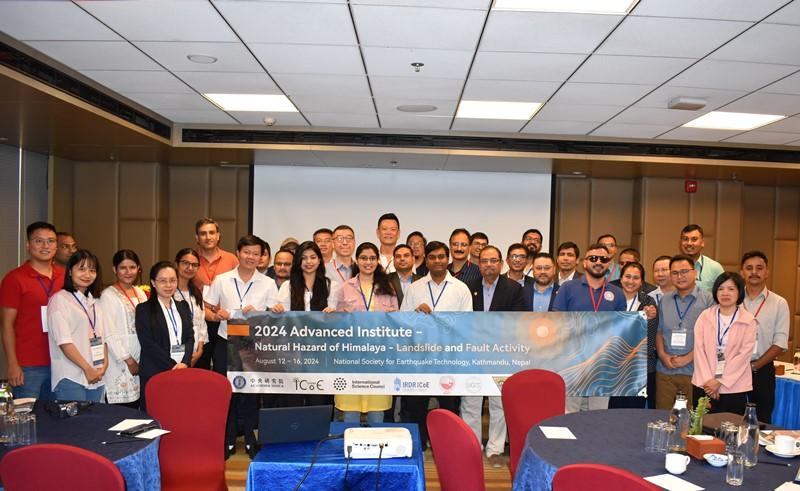
A 5-day training course has kicked-off, on Aug 12, 2024, in Kathmandu with the objective to impart fundamental information and knowledge about landslides, contributing to future hazard mitigation efforts and thereby reducing human casualties and property losses in societies at risk. The program
“2024 Advanced Institute on
Natural Hazard of Himalaya – Landslide and Fault Activity” has been organized by the Advanced Institute on Natural Hazard of Himalaya – Landslide and Fault Activity (AI on NHH - LFA). The Advanced Institute (AI), supported by IRDR ICoE-Taipei, National Central University, and Academia Sinica, aims to deliver a concise yet comprehensive program that includes a series of in-depth lectures, practical exercises, and a field trip. National Disaster Risk Reduction and Management Authority (NDRRMA) and National Society of Earthquake Technology - Nepal (NSET) are hosting the course in Nepal.
Addressing the opening session, Mr. Anil Pokharel, Chief Executive of NDRRMA, highlighted the importance of such scientific efforts in addressing potential threats from natural hazards, particularly landslides. He shared, “The whole Asia-Pacific region is a minefield for disasters, with Nepal at the center, being a hotspot for landslides. Nepal is confronting a lot of landslides. Just this year alone, we've lost around 170 people because of landslides. There's so much uncertainty behind it, and the gathering of the best minds on this issue provides an important opportunity to learn from each other’s experiences through lectures and interactions.”
NSET President Dr. Amod Mani Dixit emphasized the need for research on disasters related to landslides, as they have proven costly in terms of loss of lives and property in Nepal. He stated, "People are suffering due to the huge casualties and economic losses caused by landslides of various origins and their cascading effects. The classical approach to landslide analysis, such as SURF analysis, and the different nature of landslides and the casualties they inflict, demand innovation and new ways of looking at things." Dr. Dixit further shared: " NSET started working on landslide assessment after the 1988 earthquake, which generated thousands of landslides, both triggered and new. What I want to say is that this advanced institute is a wonderful opportunity”.
Dr. Chung-Pai Chang, Professor at the Center for Space and Remote Sensing Research at National Central University (NCU) and Executive Director of IRDR ICoE-Taipei, highlighted the objectives of the event. Welcoming the participants and experts from around the world in the program, he shared that this is the forum to exchange and discuss the latest advancements in landslide and hazard activity research. He also expressed his gratitude to local host NSET and NDRRMA.
Mr. Surya Narayan Shrestha, Executive Director of NSET expressed his happiness over hosting the this very important event on Advanced Institute of this year in Nepal as it would enhance the understanding of landslide because several South Asian as well as Southeast Asian countries on better understanding on the fault activities subsequently, landslide activities, be it fault, generated landslide or rain induced landslides. He shared, “the Sendai framework, understanding the risk is what something very much needed to reduce the risk to reduce the death and injuries and property losses that has been causing major problem around the world. So, I believe this this event will contribute first understanding the science better, understanding the science of landslides later, and also understanding the modern technologies available for understanding this behavior of this phenomenon in the region better”.
AI on NHH – LFA is designed to delve into critical topics necessary for comprehending and mitigating landslide hazards. The primary objectives of the institute include providing participants with a comprehensive overview of the geological background of the Himalaya and exploring factors that contribute to landslide vulnerabilities. Investigation with laboratory tests and field monitoring will be included as part of the training. Moreover, the institute will introduce participants to InSAR (Interferometric Synthetic Aperture Radar) technology, emphasizing its relevance in studying active fault lines and landslide activities.
Participants are expected to gain practical knowledge in landslide investigation, monitoring techniques, and analytical methodologies to facilitate effective hazard assessment. A focused discussion is to center around earthquake and rainfall-triggered landslides in Nepal, addressing specific challenges associated with these events. This discussion aims to contribute to a deeper understanding of the complex phenomena related to landslides in the region.
Although the training course is designed for approximately 20 young to mid-career participants with an interest or involvement in geological science, hazard analysis, and the mitigation of landslide risks in the Himalayan region from academia, practitioners, and policy communities in South and Southeast Asian countries, a total of 36 persons from Taiwan, Vietnam, Laos, India, Pakistan, Indonesia, and Nepal are participating in the training program.
Key featured speakers of the program include Dr. Pradeep Goswami, Head of the Geology Department, Kumaun University, India; Dr. Yadav P. Dhakal, Professor of Geology, Tribhuvan University, Nepal; Dr. Jia-Jyun Dong, Professor of Civil Engineering, National Central University (NCU), Taiwan; Dr. Chih-Chung Chung, Professor of Civil Engineering, National Central University (NCU), Taiwan; and Dr. Chung-Pai Chang, Professor at the Center for Space and Remote Sensing Research at National Central University (NCU). The program is scheduled to conclude on August 16, 2024.
Image gallery




